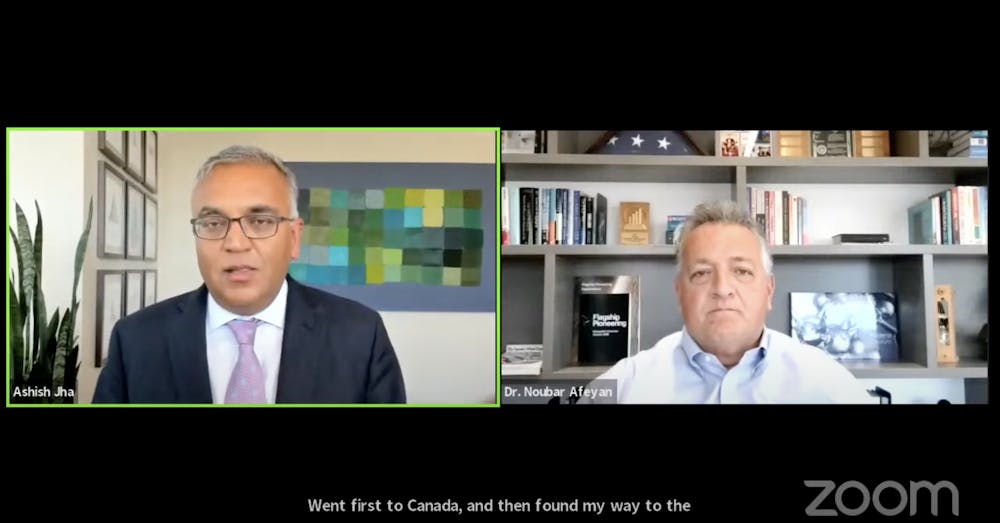Noubar Afeyan, co-founder and chairman of the board of Moderna and founder and CEO of Flagship Pioneering, joined Ashish Jha, dean of the University’s School of Public Health, in a virtual conversation Thursday afternoon.
The two began their conversation by discussing their journey as immigrants in America and how displacement shaped their identities. Jha grew up in India and moved to Canada before eventually finding his way to the US. Afeyan, whose family moved to Canada as political refugees during the 1975 civil war in Lebanon, came to the US to earn his PhD in biochemical engineering from Massachusetts Institute of Technology. Afeyan spoke about how most of his work is rooted in his experience as an immigrant and how he didn’t have the comfort of feeling native or settled. He also mentioned the competitive advantage it gave him in dealing with adversity and uncertainty — his 59 years of life have made him view “innovation ... just as intellectual immigration,” he said.
The two then spoke about Afeyan’s journey from being an engineer at MIT to founder of Flagship Pioneering. Afeyan recalled how his chance encounter with David Packard, co-founder of Hewlett Packard, at a conference in Washington, D.C. inspired him to take courses in management and start a company to make tools for the biotech industry. “It was a crazy notion back then ... there was no diversity (among business founders),” he said.
Drawing from experience in simultaneously running companies in the drug discovery, diagnostics and vaccine fields, he founded Flagship Pioneering in 2000.
“Flagship was set up as an institutional platform to make innovations and create companies, … and that’s what we ended up doing for 10 years … experimenting … (with) how to make internally breakthrough innovations,” he said.
Afeyan also spoke in detail about Moderna’s “internal breakthrough,” an exploration spurred by the question “What if?” Unlike conventional biotech companies that launch with an invention ready for licensing, Moderna began with an idea of Afeyan’s inspired by the work of Bob Langer, who was at the time a junior faculty member at Harvard Medical School. Langer was looking into mRNA modified through a technique developed at Penn in order to make Yamanaka factors to transform human fibroblasts into a type of stem cell.
“This raised the question in my mind … What if that same notion could be used to cause a human to make any protein we want in their body as a drug?” Afeyan said. Not knowing how to proceed, he decided to take a leap, founding one of the world’s leading mRNA technology companies, Moderna, in 2010.
Moderna has emerged as a lead vaccine developer during the COVID-19 pandemic, and the two spoke about the company’s journey to developing millions of vaccine doses.
Afeyan credited Moderna’s vaccine rollout success to the decade spent by the company before the COVID-19 pandemic developing an extensive biotech platform. He also mentioned Moderna’s efforts at developing and clinically testing mRNA vaccines as early as 2015, with the intention of using sequences humans had never seen before and testing the number of antibodies the vaccines can generate. “That was very interesting in hindsight … (as) a procedure of what was to come,” he said.
Along with scientific discourse, the webinar included questions from Jha and attendees regarding improving general access to lifesaving medicines and Moderna’s responsibility in increasing global vaccination in the pandemic, particularly for countries and people who can’t afford it.
Afeyan spoke about the financial ecosystem that has been created as a result of the pandemic which includes both competition and cooperation for vaccine distribution. “What was clear to me was that the Western countries, most notably the US and Europe, had already secured the vast majority, if not all of the supply going into 2021, and they knew that the only source of donations and supply legally would have been through the governments,” he said. “Legally, the manufacturers were forbidden to send a single dose anywhere other than where they were bought.”
Attendees raised questions about Moderna’s effort to release intellectual property and transfer technology to increase manufacturing of vaccines in the pandemic. Afeyan answered the questions about Moderna’s IP by bringing to light the company’s unilateral decision not to impose intellectual property rights concerns on anyone using their IP to manufacture mRNA vaccines. This choice was made in October 2020 before an authorized vaccine for COVID-19 existed. He also highlighted the lack of media coverage surrounding the topic.
Afeyan responded to concerns about technology transfer. “Long before this pandemic, the issue of technology transfer has been raised for decades … I believe that is a very reasonable thing to consider if you have a supply constraint. But the reality is … that between Pfizer’s supply and Moderna’s scale-up supply (of 3 billion doses) that is being put in place for 2022 … we will have … more than enough capacity to vaccinate the world,” he said.
Afeyan mentioned an announcement made by Moderna to open a plant in Africa that will manufacture supplemental dosesand thus lead to a technology transfer. He also highlighted several of Moderna’s ongoing efforts to increase vaccine supply to low-income countries and stressed the importance of political will and intergovernmental collaboration to make that happen.
Beyond the current COVID-19 vaccine, Afeyan also discussed Moderna’s goal of developing a vaccine by next fall with combined effects on multiple variants of influenza, COVID-19 and other respiratory viruses.
The conversation ended with Jha and Afeyans’ discussion on the challenges of cancer therapies, as well as broader ideas about creating ecosystems for life science innovation and increasing global accessibility in the field.
“I have been struck by how much there is collective interest in trying to move the world in the right direction,” Jha said. “And I think Moderna has been a really important part of that.”





